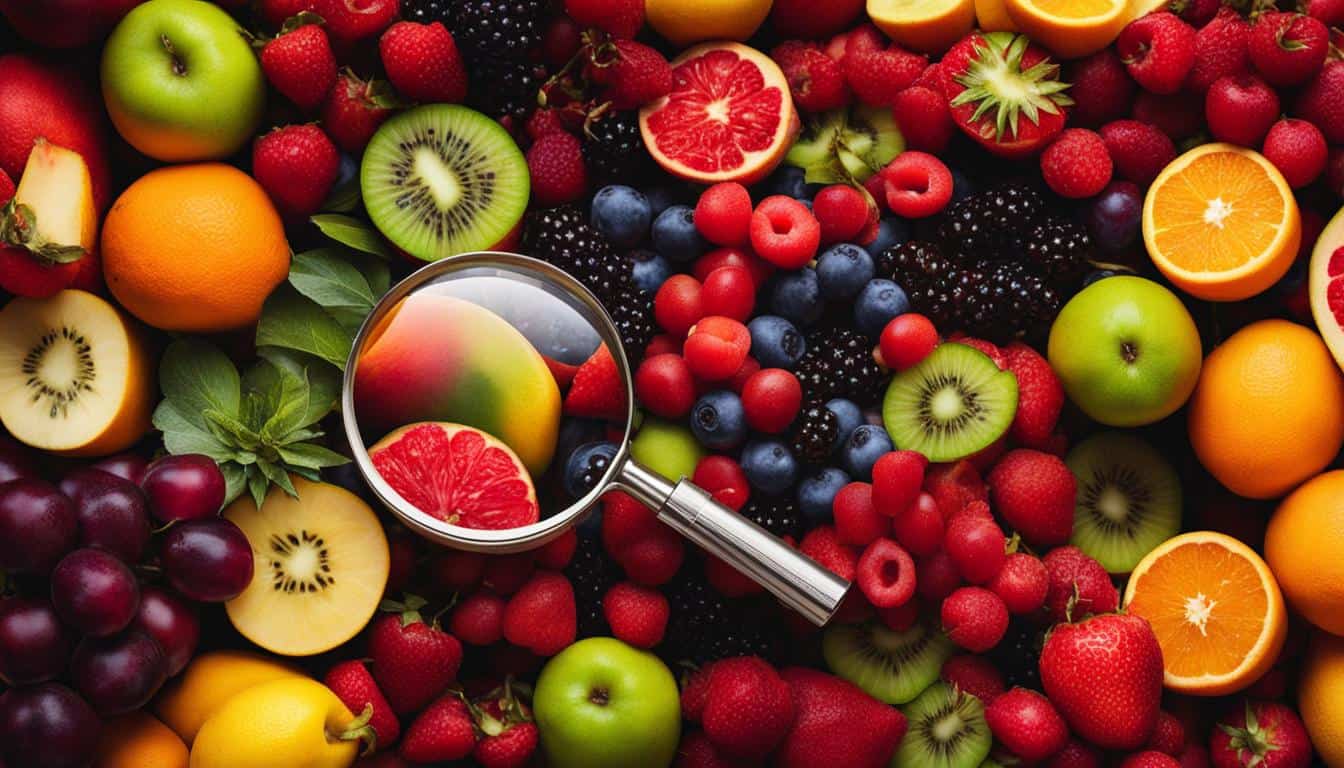In this article, I will explore the question of whether natural fruit sugar is bad for you. We will dive into the health effects of natural fruit sugar, including its impact on weight gain and the potential negative effects of fructose. Additionally, we will compare natural sugar to artificial sugar to understand the differences and determine which is better for your health.
Key Takeaways:
- Excessive consumption of natural fruit sugar can contribute to weight gain.
- Regularly consuming sugary foods and drinks may lead to insulin resistance and a higher risk of type 2 diabetes.
- A high sugar intake is linked to an increased risk of heart disease, dental decay, and mental health disorders.
- When consumed, sugar triggers the release of dopamine, a neurotransmitter associated with pleasure and reward, which can lead to cravings and withdrawal symptoms.
- Fruits and natural sweeteners can offer healthier alternatives to refined sugars.
The Science of Sugar and its Effects
Excessive sugar consumption, including natural fruit sugar, has been linked to various health issues. One of the most concerning effects of sugar is its contribution to obesity. High sugar intake can lead to weight gain, as sugary foods and drinks are often high in calories and can increase overall calorie intake. This excess calorie consumption can result in the accumulation of body fat and an increased risk of obesity.
In addition to weight gain, regularly consuming sugary foods and drinks can also have detrimental effects on our overall health. One of the key concerns is the impact of sugar on the development of type 2 diabetes. Research has shown that a high intake of added sugars, including natural fruit sugar, can contribute to insulin resistance, a condition in which the body’s cells become less responsive to the hormone insulin. Insulin resistance is a major risk factor for the development of type 2 diabetes.
Sugar intake also has implications for heart health. Studies have found that high sugar consumption is associated with an increased risk of cardiovascular diseases, including heart disease. Excess sugar intake can lead to elevated blood sugar levels, inflammation, and harmful changes in blood lipid profiles, all of which can contribute to the development of heart disease.
Table: Health Effects of Sugar
| Health Effect | Description |
|---|---|
| Obesity | High sugar intake can contribute to weight gain and obesity. |
| Type 2 Diabetes | Regular consumption of sugary foods and drinks can increase the risk of insulin resistance and the development of type 2 diabetes. |
| Heart Health | Excessive sugar consumption is associated with an increased risk of cardiovascular diseases like heart disease. |
| Dental Health | Sugar can contribute to tooth decay and cavities when consumed in excess. |
| Mental Health | Emerging research suggests a connection between high sugar consumption and an increased risk of mental health disorders. |
Dental health is another area affected by sugar consumption. When we consume sugary foods and drinks, the bacteria in our mouths feed on the sugars and release acids that can erode tooth enamel, leading to tooth decay and cavities. Limiting sugar intake and practicing good oral hygiene are essential for maintaining dental health.
Finally, emerging research has started to explore the potential link between sugar consumption and mental health. Some studies have found associations between high sugar intake and an increased risk of mental health disorders, such as depression and anxiety. While more research is needed to fully understand this connection, it highlights the importance of considering the impact of sugar on our overall well-being.
Mechanism of Glucose Metabolism and Storage

In order to understand the impacts of natural fruit sugar on our health, it’s important to grasp the mechanism of glucose metabolism and storage in our bodies. When we consume carbohydrates, they are broken down into glucose molecules, which serve as the body’s primary source of energy. Glucose is then transported through the bloodstream to our cells, where it can be utilized through energy production.
Glucose can be utilized in two main ways. The first is through glycolysis, where glucose is broken down in the cytoplasm of cells to produce energy in the form of adenosine triphosphate (ATP). This process occurs in all cells and is essential for various metabolic functions.
The second way glucose is utilized is through its storage as glycogen. When glucose levels are high, the liver and muscles store excess glucose as glycogen, forming a reserve that can be accessed when energy demands increase. This stored form of glucose can be broken down back into glucose through a process called glycogenolysis, providing a quick and easily accessible energy source.
Glycogenesis and Glycogenolysis
Within our bodies, glycogenesis is the process where glucose molecules are converted into glycogen and stored in the liver and muscles. This process helps regulate blood sugar levels and ensures a constant supply of energy for our cells. On the other hand, glycogenolysis is the breakdown of glycogen back into glucose to meet the body’s energy requirements.
A comprehensive understanding of glucose metabolism and storage is crucial in evaluating the impact of natural fruit sugar on our health. By examining how our bodies process and utilize glucose, we can gain insights into the potential effects of excessive sugar consumption and make informed choices about our dietary habits.
Long-Term Effects of High Sugar Intake
Consistently consuming high levels of sugar can have significant long-term effects on our health. Some of the most concerning consequences include obesity and metabolic syndrome, insulin resistance and the development of type 2 diabetes, cardiovascular health issues, non-alcoholic fatty liver disease, and cognitive health impairment.
Obesity and metabolic syndrome are closely linked to excessive sugar intake, especially in the form of added sugars found in processed foods and beverages. These conditions can increase the risk of heart disease, stroke, and other serious health problems. Research has shown that individuals with higher sugar consumption are more likely to develop insulin resistance, a condition in which the body’s cells become less responsive to the hormone insulin. This can lead to the development of type 2 diabetes, a chronic disease that affects how the body regulates blood sugar levels.
Furthermore, studies have found a strong association between high sugar consumption and negative cardiovascular health outcomes. Excessive sugar intake can contribute to elevated blood pressure, inflammation, high triglyceride levels, and reduced levels of HDL cholesterol, all of which are risk factors for heart disease. Non-alcoholic fatty liver disease is also a potential consequence of a high-sugar diet. This condition occurs when excess fat accumulates in the liver, leading to inflammation and liver damage.
Emerging research suggests that high sugar consumption may also have negative effects on cognitive health. Studies have found associations between a diet high in added sugars and an increased risk of cognitive decline, dementia, and impaired memory and learning abilities. The exact mechanisms behind this relationship are still being studied, but it is believed that chronic inflammation, insulin resistance, and oxidative stress may play a role.
It is important to note that while excessive sugar consumption can have these detrimental effects on health, it is the overall dietary pattern that matters. A diet that is high in added sugars but also includes a range of other unhealthy foods can compound the negative health effects. On the other hand, a balanced diet that includes moderate amounts of natural sugars, such as those found in fruits and vegetables, can be part of a healthy lifestyle.
It is crucial to be mindful of our sugar intake and make informed choices about the foods and beverages we consume. By reducing our reliance on processed and sugary foods, we can significantly improve our long-term health outcomes and reduce the risk of developing chronic diseases.
The Brain’s Response to Sugar

When it comes to sugar consumption, our brains play a crucial role. The moment we consume sugar, our brain releases dopamine, a neurotransmitter associated with pleasure and reward. This release creates a sense of euphoria and can lead to cravings for more sugar. In fact, studies have shown that sugar can have an addictive nature, similar to drugs like cocaine and nicotine.
These cravings and the subsequent consumption of sugar can create a cycle of addiction, making it difficult to cut back on sugar intake. When we attempt to reduce our sugar consumption, our brain reacts with withdrawal symptoms, including irritability, mood swings, and even headaches. This further highlights the powerful impact that sugar can have on our brain chemistry.
Understanding the brain’s response to sugar is essential for addressing our sugar consumption habits and making healthier choices. By recognizing the addictive nature of sugar, we can take proactive steps to reduce our intake and foster a healthier relationship with food.
Why Sugar Tastes Good

Sugar’s irresistible sweetness is not just a matter of personal preference. It has evolved to taste good because it offers an evolutionary advantage. Our ancestors relied on high-calorie, nutrient-dense foods to survive, and sweetness was a reliable indicator of these valuable resources. When we consume sugar, our brain releases dopamine, a neurotransmitter associated with pleasure and reward, reinforcing our desire for sugar.
The immediate energy boost provided by sugar also plays a role in its appeal. In times of energy deficit, our bodies naturally crave quick sources of fuel. Sugar can provide a rapid influx of glucose, the primary energy source for our cells. This immediate burst of energy can be essential for survival in certain situations.
Cultural and psychological factors also contribute to our preference for sweetness. Across cultures, sweetness is associated with positive emotions and comfort. We learn to associate sweet flavors with joy, celebration, and indulgence. Additionally, the ubiquity of sugary treats in our modern food environment, combined with clever marketing, further reinforces our inclination towards sugar.
| Evolutionary Advantage of Sweetness | Dopamine Release from Sugar | Immediate Energy Boost from Sugar | Cultural and Psychological Factors |
|---|---|---|---|
| Signal of high-calorie, nutrient-dense foods | Associated with pleasure and reward | Provides quick fuel for the body | Association with positive emotions and comfort |
| Evolved preference for survival | Reinforces desire for sugar | Essential for energy deficit situations | Learned associations and marketing influence |
Understanding the factors that make sugar taste good can help us make informed choices about our sugar consumption. While the appeal of sugar is deeply ingrained in our biology and culture, it is important to remember that moderation is key. By balancing our desires for sweetness with a nutritious and varied diet, we can enjoy the pleasures of sugar without compromising our overall health.
Healthier Alternatives

When it comes to satisfying our sweet cravings, there are healthier alternatives to consider. Instead of reaching for refined sugars, we can turn to nature’s bounty – fruits. Fruits are not only naturally sweet but also come packed with fiber, vitamins, minerals, and antioxidants that are beneficial for our health. Incorporating a variety of fruits into our diet can provide a delicious and nutritious way to satisfy our sweet tooth.
In addition to fruits, there are also natural sweeteners that can be used as alternatives to refined sugars. Natural sweeteners like honey, maple syrup, agave nectar, and stevia are derived from plants and offer a sweeter taste without the negative health effects associated with excessive sugar consumption. These natural sweeteners may also have lower glycemic index levels, making them a suitable option for those looking to manage their blood sugar levels.
It is important, however, to remember that even though these natural sweeteners are a healthier alternative to refined sugars, moderation is still key. While they may offer some nutritional benefits, they still contain calories and can contribute to weight gain if consumed in excess. It’s always a good idea to use natural sweeteners in moderation and be mindful of your overall sugar intake.
Healthier Alternatives
- Incorporate a variety of fruits into your diet for a naturally sweet and nutritious option.
- Consider using natural sweeteners like honey, maple syrup, agave nectar, and stevia as alternatives to refined sugars.
- Remember to consume natural sweeteners in moderation to avoid excessive calorie intake.
“Choosing fruits and natural sweeteners as alternatives to refined sugars can provide a healthier way to satisfy your sweet cravings.”
| Natural Sweeteners | Glycemic Index |
|---|---|
| Honey | 50 |
| Maple Syrup | 54 |
| Agave Nectar | 15 |
| Stevia | 0 |
Artificial Sweeteners
Artificial sweeteners are a popular sugar substitute used in a wide range of food and beverage products. These sweeteners are designed to provide the same sweetness as sugar but with fewer or no calories. They are often used by individuals looking to reduce their sugar intake for weight management or health reasons.
The safety of artificial sweeteners is a topic of ongoing debate. The U.S. Food and Drug Administration (FDA) plays a crucial role in assessing the safety of these sweeteners. Before an artificial sweetener can be approved for use in food products, it must undergo extensive testing and evaluation to ensure that it meets the FDA’s safety standards.
While the FDA has approved several artificial sweeteners for use, some studies have raised concerns about potential health effects. However, these concerns have not been widely supported by scientific evidence, and the FDA continues to assert that artificial sweeteners are safe for consumption within recommended limits.
It’s important to note that individual tolerance to artificial sweeteners may vary, and excessive consumption may have gastrointestinal effects for some people. As with any food or ingredient, moderation is key. It is recommended to follow the FDA’s guidelines and consume artificial sweeteners in the appropriate amounts to ensure their safety and avoid potential negative health effects.
Natural vs. Artificial Ingredients: Debunking the Naturalistic Fallacy
When it comes to choosing the ingredients in our food, the debate between natural and artificial options is fierce. Some believe that natural ingredients are inherently better for our health, while others argue that artificial ingredients are necessary for innovation and affordability. In reality, the truth lies somewhere in between. It is important to understand that the perception of natural ingredients being superior to artificial ones is often influenced by a cognitive bias known as the naturalistic fallacy. This fallacy assumes that natural is always better, but this is a flawed line of thinking that fails to consider safety and regulatory assessments.
The Food and Drug Administration (FDA) plays a crucial role in ensuring the safety of both natural and artificial ingredients. They evaluate the potential health effects and set regulations for their usage in food products. The FDA’s primary concern is the safety of consumers, regardless of whether an ingredient is natural or artificial. This means that both types of ingredients undergo rigorous testing and scrutiny before they are approved for use in food products.
It is important to recognize that natural ingredients are not always safer or healthier than their artificial counterparts. Similarly, artificial ingredients are not inherently harmful or inferior. The key lies in understanding that the safety and quality of ingredients are determined by scientific assessments and regulatory approvals, rather than simply relying on the naturalistic fallacy.
| Natural Ingredients | Artificial Ingredients |
|---|---|
| Derived from plants, animals, or minerals | Chemically created in a lab |
| May contain beneficial nutrients and antioxidants | Provide specific flavors, textures, and functionalities |
| Subject to variations in quality and availability | Consistent in quality and availability |
| Can contribute to allergies or intolerances | Minimal risk of allergies or intolerances |
Navigating the Natural vs. Artificial Debate
When considering the natural vs. artificial debate, it is important to focus on the evidence of safety and regulatory assessments rather than relying solely on personal biases. Recognizing that both types of ingredients can have their advantages and disadvantages allows for a more informed and balanced approach to food choices.
It is crucial to look beyond the naturalistic fallacy and consider the safety and quality of ingredients, as determined by scientific assessments and regulatory approvals. – Food Industry Expert
Ultimately, the decision of whether to choose natural or artificial ingredients depends on a range of factors, including personal preferences, dietary needs, and ethical considerations. By understanding the role of regulatory bodies like the FDA and avoiding cognitive biases, we can make more informed choices about the ingredients we consume.
Additives in Our Food
When it comes to the food we consume, it’s important to understand the role of additives. Additives are substances that are added to food products to enhance their taste, appearance, texture, and shelf life. They can be natural or artificial and play a significant role in our overall food consumption. However, it’s essential to scrutinize the ingredients and be aware of the potential effects that additives can have on our health.
The Food and Drug Administration (FDA) plays a crucial role in ensuring the safety of additives in our food. The FDA is responsible for conducting scientific assessments to determine the safety of food additives and regulating their usage in food products. Their assessments take into account factors such as the potential health effects and the maximum allowable levels of additives in different food categories. By setting regulations and guidelines, the FDA helps protect consumers from potential risks associated with additives.
One way consumers can scrutinize the ingredients in their food is by carefully examining nutrition labels. Nutrition labels provide valuable information about the ingredients present in the product, including any additives that may be used. By reading these labels, consumers can make informed choices about the food they consume and avoid ingredients that they may be sensitive or allergic to. Additionally, understanding the first ingredient listed on a nutrition label is crucial, as it represents the primary component of the product.
An example of a nutrition label:
| Ingredient | Amount per serving |
|---|---|
| Sugar | 10g |
| High fructose corn syrup | 5g |
| Artificial flavor | 2mg |
| Preservatives | None |
By being mindful of additives in our food and understanding the FDA’s role in ensuring their safety, we can make more informed decisions about the products we consume. Reading nutrition labels and being aware of the potential effects of additives can help us maintain a healthy and balanced diet.
Conclusion
In conclusion, natural fruit sugar, like any other form of sugar, can have both positive and negative impacts on our health. While natural fruit sugar contains essential nutrients and fiber, consuming it in excess can lead to various health issues.
Excessive intake of natural fruit sugar can contribute to weight gain, insulin resistance, and an increased risk of developing cardiovascular diseases. It’s important to practice moderation and portion control when consuming sugar, including natural fruit sugar, as part of a balanced diet.
Being mindful of our sugar consumption and making informed choices can help us maintain our overall well-being. By considering the impact of sugar on our health, we can strive to strike a balance and lead a healthy lifestyle.
FAQ
Is natural fruit sugar bad for you?
Like any other form of sugar, natural fruit sugar can have negative health effects when consumed in excess. It can contribute to weight gain, insulin resistance, cardiovascular issues, and other health conditions. However, moderation and portion control are key in maintaining a balanced diet.
What are the health effects of natural fruit sugar?
Excessive sugar consumption, including natural fruit sugar, has been linked to obesity, insulin resistance, type 2 diabetes, heart disease, dental decay, and potentially mental health disorders.
Is fructose bad for you?
Fructose, a type of sugar found in fruit and added sugars, can have negative health effects when consumed in excess. It can contribute to weight gain, insulin resistance, and an increased risk of developing type 2 diabetes.
How does natural sugar compare to artificial sugar in terms of health?
Natural sugar, found in fruits and natural sweeteners, comes with added benefits such as fiber, vitamins, minerals, and antioxidants. Artificial sugar substitutes, on the other hand, provide sweetness without the calorie content of sugar. The safety of artificial sweeteners is assessed by regulatory bodies like the FDA, while moderation is key when consuming natural sweeteners.
Source Links
- https://ggfablog.wordpress.com/2023/08/01/unraveling-the-truth-are-all-additives-ingredients-bad-for-you-from-drinkfit/
- https://medium.com/@dr-ben-soffer/the-bittersweet-truth-unraveling-the-complex-relationship-between-sugar-and-health-612b3626cf82
- https://silva-cacao.com/articles/sugar-unraveling-common-questions-and-debunking-myths/





Leave a Reply